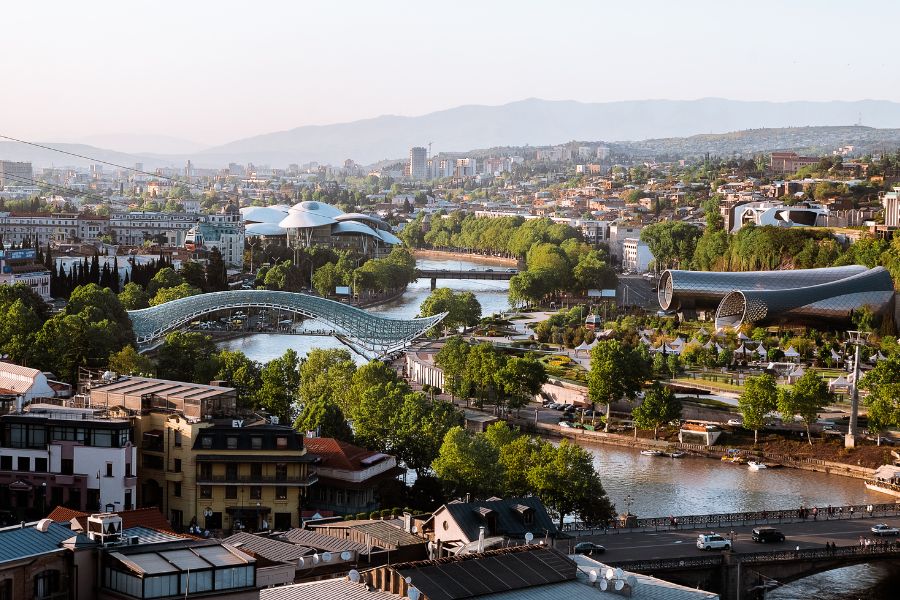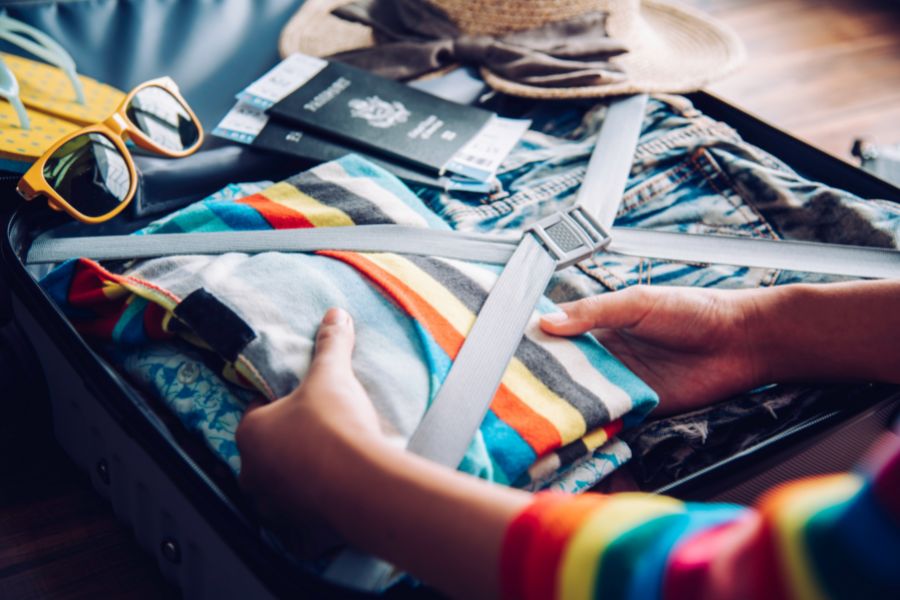Are you looking for a place to settle for a while? Tbilisi, Georgia might be the city you are looking for. It has everything you might need, from a decent cost of living and fun things to do, without being packed with tourists (yet).
The article will examine how the cost of living in Tbilisi, Georgia compares to other popular nomad destinations. We will sum up the estimated monthly costs including rent prices, food, and other expenses.
Let’s dig in!

Table of Contents
Toggle
An Overview of Georgia
Many people have not heard about this beautiful country situated in the Caucasus. And it is understandable; Georgia hasn’t been a big player in the global tourism industry until recently. This European hidden gem is bordered by Russia, Turkey, Armenia, and Azerbaijan, with access to the Black sea. Even though it is not very well known, the word is quickly spreading throughout the digital nomad community. The news is good with amazing food and affordable living being readily available. Although there aren’t many direct flights available, it’s worth the journey.
Georgia is a fantastic balance of cities with modern comfort and untouched nature. The country is regarded as one of the best places to hike and ride horses, with sprawling plains and enormous mountains spaced throughout the country. The country has endless tiny villages, breathtaking lakes and canyons, and challenging climbs.
However, if you’re looking for creature comforts and the bustle of an up-and-coming city, Tbilisi is a fantastic place to hang your hat for a very affordable price. With just over a million residents, it scratches the big-city vibe without feeling claustrophobic. Its infrastructure is unique as it’s been shaped by thousands of years of life and the mountains it’s nestled between. The architecture blends together Post-Soviet designs with more creative buildings.
How Expensive is Tbilisi, Georgia?
Tbilisi is the capital of Georgia and the heart of the land. It’s the largest city in both population and area.
Tbilisi is the first choice for many expats and nomads in Georgia, with Batumi and Kutaisi as secondary locations. Tbilisi’s charm lies in its ancient heritage, a feeling of Europe’s traditions, and a recent shift from its former Soviet occupation. Its main benefit is its affordability – the prices are very similar to other Eastern-European countries, and way lower than in the cities like London, Paris or Zurich. Tbilisi is only growing in popularity, so like many other cities digital nomads flock to, the cost of living is slowly going up.
As everywhere in the world, the final costs depend on your lifestyle, preferences, or even the number of people you’re traveling with – a solo traveler has different expenses than a young family of 4. There are 4 key expense categories we use to evaluate:
- Housing & Utilities
- Food costs
- Transportation
- Entertainment and other activities
Housing & Utilities
While booking your first accommodation, you might wonder where to stay and how much it costs.
Short-term living
If you are planning to visit Tbilisi for a short term only, we recommend staying in Old Town or Vera – there are many shops, great restaurants and coffee places suitable for digital nomads. You can find plenty of hotels, hostels, and Airbnbs around. You can find accommodation for as low as $18 a night.
Staying long-term
For slowmads or nomads planning to stay for a few months, you can choose between locations like Vera, Vake, Saburtalo, and Marjanishvili. It takes roughly 10–20 minutes to get to the city center, but the living costs are way lower. If you’re looking at staying for a month or less, housing expenses are typically higher. However, rent prices decrease once you book accommodations for six months or more.
The monthly rent of a single-bedroom apartment in these areas can vary from 800 to 2000 GEL ($250 – $750) depending on location and amenities, and a three-bedroom apartment can cost between 1600 to 3000 GEL ($550 –$1100).
If this is a bit out of your budget and you don’t need high comfort, brand-new appliances, or air conditioning, you can get a studio apartment outside the city center for as low as 420 GEL (appx. $150).
Are you staying in Tbilisi long-term, but prefer the comfort of living in the city center? The average price for a one-bedroom apartment is 1900 GEL ($700) or 3500 GEL ($1300) for three bedroom apartment.
Utility prices
If you book Airbnb or a hotel, utilities are usually included in the final price. However, if you are renting, utilities can increase your rent expenses from 150 – 400 GEL (~$55 – $150), including electricity, water, and internet. Most prices can be negotiated with the landlord or realtor you use. It never hurts to ask.

Food costs
Georgians have fantastic food. It is delicious and rich in flavor, but it can be heavy. It has some similarities with Mediterranean and Middle Eastern cuisine, but due to the presence of the Caucasus Mountains the food is hearty. Eating out is affordable compared to the US, with many local and international chains available. Still, like everywhere, dining in tourist zones like central Tbilisi will cost much more than in local markets or traditional restaurants.
The typical Georgian food is served family style, with many plates to share. The price for a meal for 2 in a Georgian restaurant can go up to 150 GEL ($55), but if you eat more locally, the price is usually around 20 GEL ($7). For small bites, you can try one of the national foods, Khinkali, a massive soup dumpling. They usually go for 1 – 2 GEL a piece (~$0.50). Meat lovers can try Mtsvadi (meat skewers), which cost roughly 10 – 15 GEL per stick (~$3.60–$5.50).
Eating in the local restaurants can seem intimidating at times, but most locals are eager to show you their culture and food. The ability to eat affordably and take part in local customs is a huge advantage of being a digital nomad.
Drinks follow the same rule. The Georgian draught beer might cost around 4 GEL (~$1.50), but for imported ones, you might pay double. Are you more of a wine person? The typical Georgian
wine will surely impress you, as Georgia claims to be the birthplace of wine. It can cost between 3 – 10 GEL for a liter of wine (~$1 – $3.60).
When you are on a tight budget, it is better to shop for fruit and veggies at local markets and cook at home. Wet markets and produce stands can be found scattered throughout the city. They offer everything from homemade bread to in-season fruits and vegetables. You can also find honey, eggs, spices, and lots of other goodies.
When you shop locally, you are not only getting the best deal, but you are also supporting local farmers.
Supermarket prices vary in prices and won’t be as cheap as the produce stands available in the wet markets, but, they have another thing to offer – food counters and bars with takeaway food. These meals can cost you between 3 – 10 GEL (~$1 – $4).
Transportation
Tbilisi has an extensive public transportation system. You can get pretty much anywhere by bus or metro. A single ticket is valid for 90 minutes and costs 1 GEL (~$0.40). Besides the one-ride ticket, there are also other options; some of the most popular are weekly and monthly passes for 20 GEL and 40 GEL (~$7.50 and $15).
Taxis are more expensive than other types of transportation but are still affordable and safe. Use rideshare apps like Bolt and Yandex to avoid any taxi scams.
Both locals and expats tend to prefer Bolt drivers as the app’s interface is clear, the drivers show up on time, and there isn’t a long waiting time. Yandex, however, has the “Don’t call me” option for those who cannot speak Georgian. Another great tool, “The fastest car” might come in handy when you’re in a rush. However, for this service, you’ll have to pay extra.
The local app alternatives are Taxi maxim or Taxionn. If you want to support Georgian start-ups, those options are great, but you may find them a bit difficult to use.
The taxi ride will cost appx. 4 – 6 GEL a ride ($1.50 – $2.50) or slightly more, depending on your location, current hour, etc.
Local taxi companies are also available, but it is usually more expensive to hail a cab on the street. Some taxis do not have a taximeter, so you must negotiate the price in advance.
Entertainment and other activities
While planning your budget, you cannot forget your pocket money for entertainment. Georgia has plenty to offer – from outdoors to ceramic courses. Here are some things you might be interested in.
- Gym membership: from 140 GEL/month (~$50)
- Cinema ticket: 15 GEL (~$5.50)
- Entrance to a National Park: 0 – 23 GEL (up to $8.50)
- A room at the Tbilisi sulfur baths: 70 – 400 GEL (~$25 – $150)
- Yoga class: 25 GEL (~$9.20)
Remote work and internet in Tbilisi
A lot of people who are planning to spend more time in Georgia probably work remotely or are digital nomads. It is easy to stay online in Tbilisi – there are plenty of coffee shops with free wifi, coworking spaces, and mobile plans for an affordable price. The internet you can get in your home can be very fast, reliable, and affordable, too.
Co-working spots
Coworking spaces are one of the nomads’ most useful tools for maintaining a schedule. Tbilisi keeps up with the trends – there are some cool spots in the city. They usually have a few passes available, from daily to unlimited ones. Monthly membership can cost $90 and more.
Are you looking for a co-working space? Here are some of the best ones in Tbilisi:
Internet prices
Cell phone data is useful whether you are lost in the city or need to call a cab. It is incredibly cheap to get service in Georgia, and you have a few options to choose from. Magti, Silknet-Geocell, and Beeline are some of the most popular choices. It is easy to find a deal with 5 GB of internet for 30 days for 12 GEL (~$4.40). The internet is reliable and is available almost everywhere in the country, even in more remote locations.
Coffee and brunch
Coffee shops in Tbilisi might surprise you with the affordable prices and good service. You can find more traditional breakfast options like eggs benedict and avocado toast alongside more local options like kikliko (Georgian french toast) and syrniki (Russian-style pancakes). A portion can cost 10 to 15 GEL (~$4 – $5.50), and a cappuccino 7 GEL (~$2.50).
Tbilisi is equipped for our digital age – plenty of coffee places with free wifi you can work from. The list of the go-to coffee places includes:
- Linville
- Lui Coffee
- Lolita
- Sculpture Bar
- Coffee LAB
- Shavi Coffee Roasters
- Daily Grind
- Pulp

Tbilisi Monthly Budget
To find out how much you need to live comfortably in Tbilisi, let’s sum up the monthly living expenses.
Suppose you choose to live in the city center, renting a one-bedroom apartment. In this scenario, you might pay 1975 GEL ($700).
You will spend around 850 GEL ($300) if you cook your own meals and occasionally eat in local restaurants. Another 300 GEL ($110) is for coffee, drinks, and nightlife.
If you are getting around mainly by public transport and walk a lot, you can pay 70 GEL ($26) for getting around.
The price for co-working memberships, gym memberships, and entertainment can also vary. On average, we can count on 560 GEL ($200).
Other unexpected expenses might include household goods or clothes. In our example, we will do 280 GEL ($100).
The approximate monthly budget for expats and digital nomads who want to live comfortably is $1,436/month (4,035 GEL). To sum it up:
- Rent: $700
- Food: $300
- Coffee & nightlife: $110
- Transportation: $26
- Coworking/Gym/Entertainment: $200
- Household goods, clothes, etc.: $100
- Total: $1,436
If you opt for a cheaper apartment, no coworking or gym memberships, and eat out less, you can get your budget closer to $1,000 (3,400 GEL).
Is Tbilisi a good place to live?
Tbilisi is a great city for digital nomads and those who want to keep their budgets tight without compromising comfort. It is one of the most affordable capital cities in Europe. If you don’t need much to be happy, you can easily live here for $1,000 a month, because of its low cost of living. Georgia is a little out of the way, but there is a reward in great living conditions and a unique experience for those who make the journey.
Tbilisi FAQ
What’s Georgia’s official currency?
The currency in Georgia is the Georgian Lari (GEL). There are very few instances where paying with an international card isn’t accepted, but it’s always best to carry local currency on you.
Is Tbilisi safe?
Georgia overall, including Tbilisi, is safe for solo travelers, families, and female travelers. With lower rates of violent crime than most of the United States per capita, it’s considered to be one of the safer developing nations available for digital nomads. The country was strongly affected by corruption in the past, but nowadays the situation is improving.
Is tap water drinkable in Tbilisi?
Feel free to drink tap in Georgia. The water is potable and even tasty. Some well-known bottled mineral water companies are in Georgia, e.g., Borjomi or Likani, and they are delicious. If hiking is on your agenda, there are many streams and rivers most locals drink from frequently with no issues.
Do Georgians speak English?
While traveling in tourist areas, you might not have a problem conversing in basic English. Many young Georgians speak English since they learn it at school. English is spoken widely in Tbilisi, but you shouldn’t count on everyone knowing the language. If you plan to visit off-beat villages or talk to older folks who haven’t studied the language, some phrases in Georgian will be helpful.



